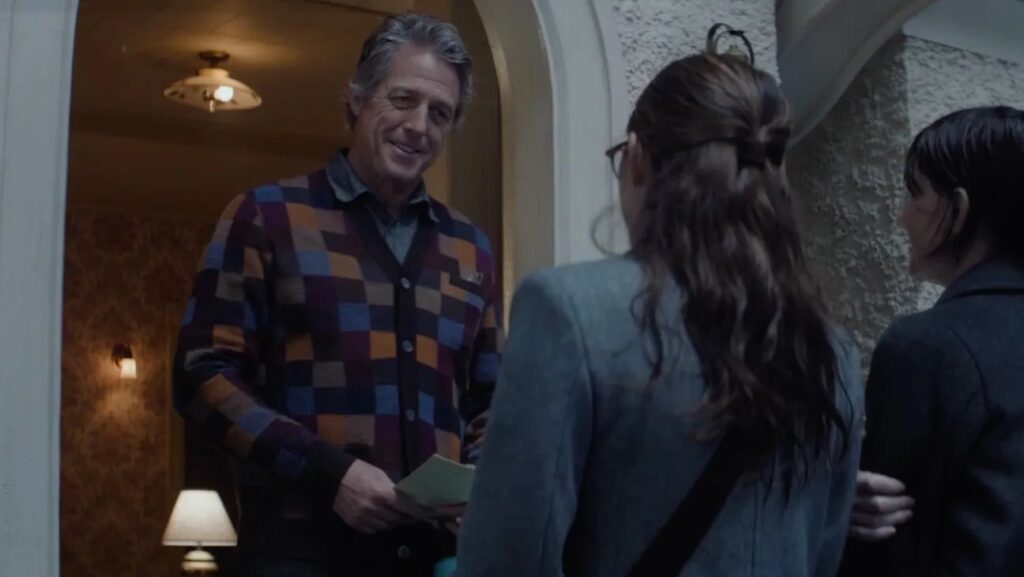
The girls aren’t stupid. They know that something is off—that the house is too small, the man too odd, the light too dim. They don’t behave like stereotypical female victims in a horror movie, even as they gradually realize they’re very much starring in one.
Their names are Sister Paxton (Chloe East) and Sister Barnes (Sophie Thatcher), and they are Mormon missionaries crisscrossing their way through the mountain west. We first meet them sitting on a homey park bench, as Paxton is regaling Barnes with the story of how she first witnessed the existence of God in, of all things, a piece of amateur pornography. When Barnes doesn’t reciprocate with her own tale of almighty discovery, Paxton isn’t deterred. “But you know God is real,” she says sunnily, less of a leading question than a warm affirmation. That Barnes doesn’t reply speaks volumes about the temperamental differences between these two parishioners, as does the flicker of disquiet that flashes across Thatcher’s face.
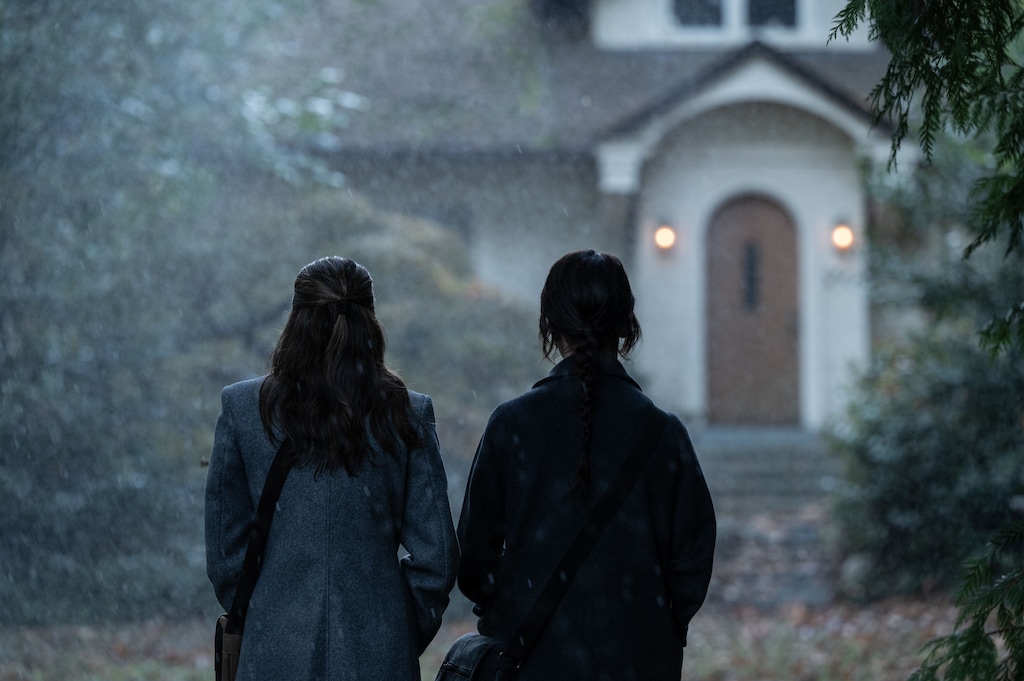
The two sisters will soon face more pressing problems than theological dialectics. Or rather, they will engage in a theological dialectic whose stakes prove to be less intellectual than visceral. The hook of Heretic, the new thriller from Scott Beck and Bryan Woods (65, the writers of A Quiet Place), is that it functions as an earnest line of philosophical inquiry as well as a red-meat horror picture. It presents the usual accoutrements of the genre—the jump scares and fresh corpses, the dank dungeons and makeshift weapons, the shocks and the screams—and packages them inside a thoughtful and even dorky debate about organized religion. It has its sacramental bread and eats it too.
At least, that’s the idea. Faith is a thornily personal matter, and while I’ve done my best to keep an open mind, I remain somewhat agnostic as to Heretic’s putative spiritual stimulation. But the pleasure of the movie is that even if you don’t respond to its (im)pious musings, you can still take rapture in its elegant construction and its masterful build of tension. There are moments—individual images, silky camera moves, entire fraught sequences—that will have even the most stubborn secularists praising the higher power that is cinema.
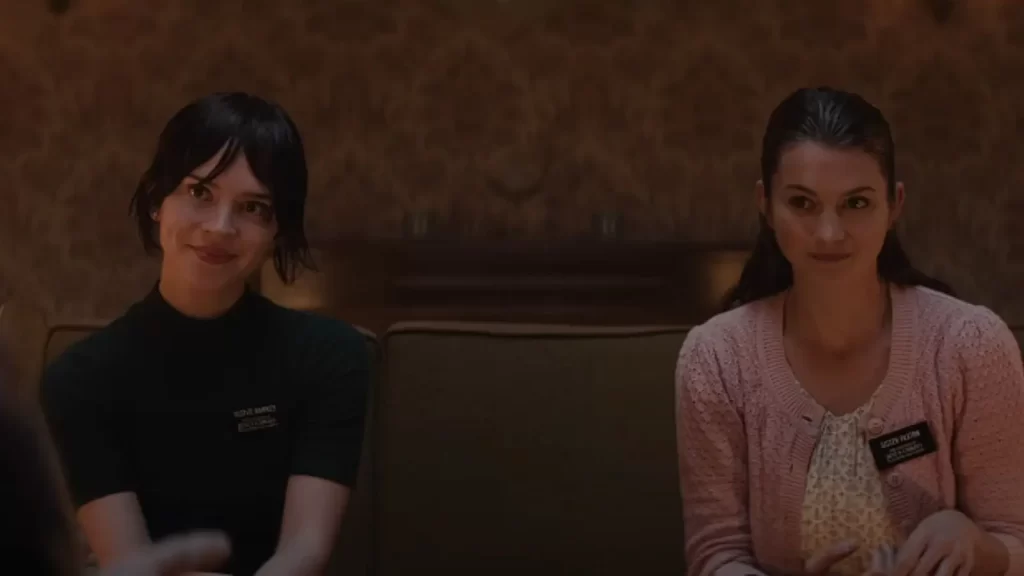
After that brief but purposeful introduction of Paxton and Barnes—which is preceded by an unnerving title sequence where the cast and crew are identified at the corners of the frame, first and last names colliding at right angles—Beck and Woods get down to brisk, not-so-bloody business. One of the sisters’ recruitment targets lives in a remote house that might as well be a witch’s hut, though the person who lives there is no crone. Known only as Mr. Reed, he exudes a warm curiosity that must be a blessed relief for the young women who spend their days getting doors slammed in their faces (or, as we see earlier, being mocked for their prim attire). Why yes, he would be happy to learn more about why Jesus Christ is his lord and savior, and he cordially invites our heroines inside for a friendly chat and a slice of blueberry pie. During their ensuing conversation, he proves to be urbane, intelligent, and charming. In other words, he’s Hugh Grant.
The casting of Grant as its titular nonbeliever is Heretic’s greatest and most obvious coup. With his gentle eyes and rounded accent, his easy laugh and tweedy demeanor, he is the embodiment of grace and decency. The trick of the movie is how it reveals, with chilling plausibility, that these surface qualities can serve as camouflage for indifference, pride, and cruelty. Grant isn’t so much playing against type as delicately and persistently warping that type into a monstrous new version of himself. He always maintains that signature veneer of politeness, never once raising his voice, even as he’s talking about murder.
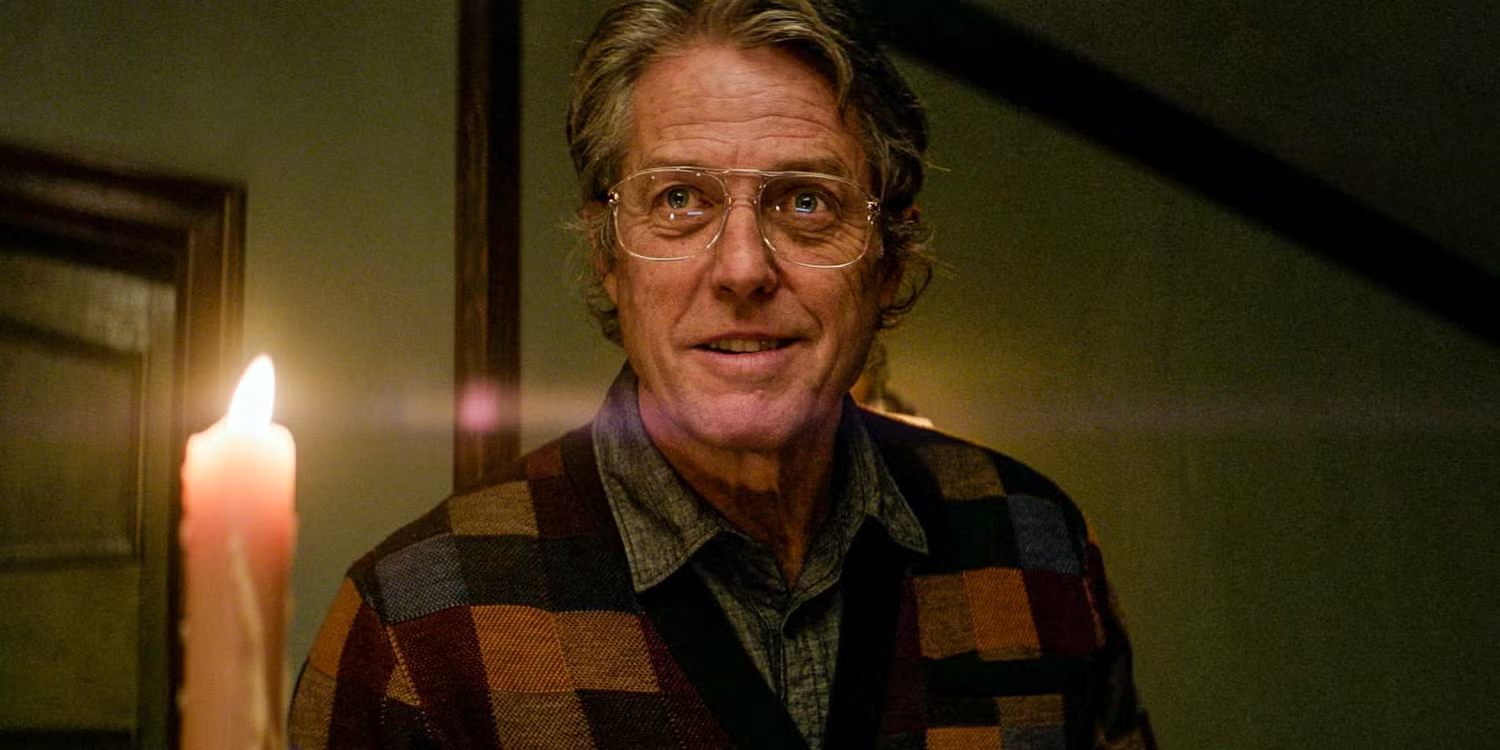
But I’m getting ahead of myself, which Beck and Woods are wise enough not to do. The beginning of Heretic is marvelously patient, as Paxton and Barnes eagerly traipse into Mr. Reed’s home and engage him in a long, thoughtful dialogue about the nature of faith. This is designed, at least at first, to resemble a genuine back-and-forth, even if Reed’s confidence—his dog-eared copy of the Book of Mormon, his stray remark that he’s at last found “the one true religion”—suggests he isn’t inclined to give much ground. The longer this triangular chat goes on, the more Paxton and especially Barnes acquire the spine-tingling sensation that they’re sheep who have unwittingly wandered into the wolf’s den.
The governing dynamics of the horror picture require a sustained and moody build-up followed by a ghastly and cathartic release, which invariably fails to measure up to the simmering dread that preceded it. Heretic hardly reinvents this formula, but it does rebalance it with a canny understanding of the genre’s conventions. It adopts a style that’s less forceful than incremental, constantly adding to its foreboding atmosphere via small gestures and sharp bits of dialogue: a pointed question about polygamy, the discovery of a scented candle, a misplaced key, a casual remark about a locked door, the lingering shot of a letter opener. All of these moments work in concert, perpetually ratcheting the tension up, even as Paxton and Barnes find themselves heading down, down, down.
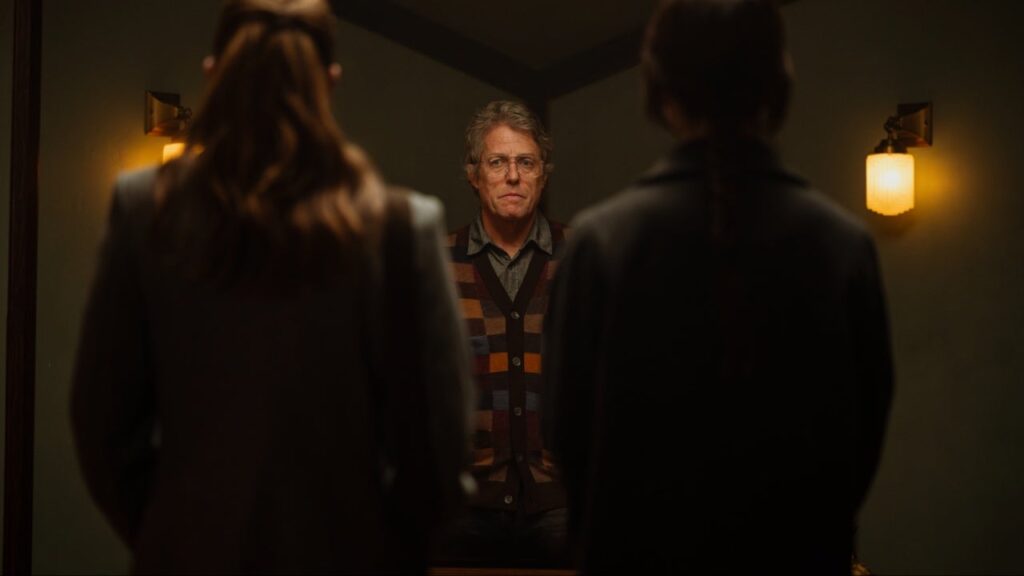
Specifically, they descend into that most sacred of locations in horror cinema: the basement. At this point, Heretic executes its obligatory pivot, transforming from an unsettling war of wills into a more typical depiction of violence and terror. The filmmakers’ handling of this material is, all in all, not bad. There are bits of inspired ingenuity, like the image of a mysteriously vacated chair or the deployment of a box cutter, that made my breath catch and my jaw drop. There are also irritating fake-outs and strenuous mutilations and tedious displays of faux mayhem. (In this regard, Chris Bacon’s screeching score is borderline obscene.) More to the point, the movie’s singular quality—the way it weaponizes knotty spiritual discourse to heighten its pervasive anxiety—dissipates in favor of a chaotic clamor that can’t help but feel generic.
What salvages Heretic, beyond the exquisite intensity and methodical craft of its early passages—the great cinematographer Chung Chung-hoon (Last Night in Soho, The Handmaiden) wields the gliding camera with fluid precision, occasionally delivering extreme close-ups to upsetting effect—is the deceptive depth of its characters and their attendant performances. Grant is merciless in how he massages his inherent smugness into a brutality dispenser, but Thatcher and East round out their potentially stock figures into actual people. Thatcher, so naturally febrile on Yellowjackets, lends Barnes a haunted quality that emphasizes her toughness; when she spits at Reed that “Your rhetoric is thin,” it’s a rare gesture of defiance which nudges the film into a different register. And East, so delightful in The Fabelmans, is heartbreakingly guileless, rendering Paxton’s tremulous agony all too human.
Still, Beck and Woods’ mission is more aligned with that of Mr. Reed—the wicked puppet master, devilishly manipulating others for his own amusement. There’s a brilliant shot late in Heretic that finds a character scrambling up a ladder, and as the camera slowly pulls back, we realize we’ve been looking at a model (shades of the opening shot of Hereditary), a diorama of pain and suffering. This is what horror directors do: place people in nightmarish scenarios and then poke and prod them for queasy entertainment. For Mr. Reed, and for this movie, there is no greater and more sadistic pleasure than the satisfaction of playing god.
Grade: B
Jeremy Beck is the editor-in-chief of MovieManifesto. He watches more movies and television than he probably should.
